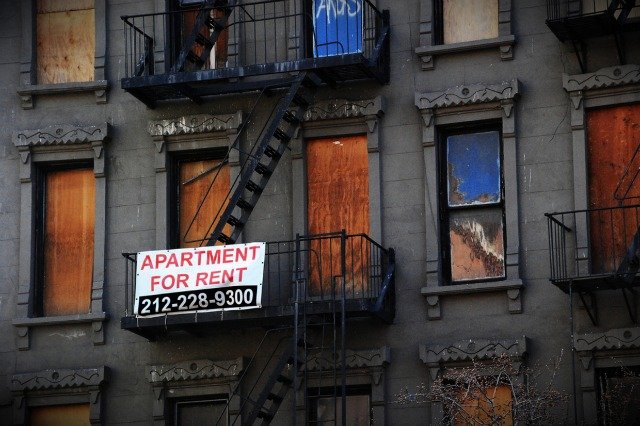What Does Albany's Rent Reform Deal Do For Market-Rate Tenants?
June 14, 2019, 10 a.m.
The state legislature's agreement does contain some interesting new provisions for all tenants, ranging on issues from security deposits to eviction proceedings.

via Flickr
Despite the months-long battle-cry of “universal rent control,” Tuesday’s historic deal on rent laws notably fell short in delivering significant protections for unregulated or market-rate tenants. Although not a surprise, legislators left out a controversial bill on “good cause” eviction, which would have added protections to market-rate tenants under certain conditions and was considered a breakthrough concept in rent reform.
Nevertheless, the state legislature’s agreement, which will go for a vote on Friday, does contain some interesting new provisions for all tenants, ranging on issues from security deposits to eviction proceedings. Although some housing economists have argued that the rent-regulated system comes at the expense of market-rate tenants, several policy and legal experts said any spillover effects from the new restrictions on rent-regulated to market rate apartments were unlikely.
The two systems are separate, said Ed Josephson, director of litigation and housing at Legal Services NYC. "I think the [market-rate] rents are high because the market is tight," he said.
Ellen Davidson, a staff attorney at the Legal Aid Society, said many of the current bill's proposals address concerns from market-rate tenants that were voiced at state hearings.
Davidson said the bill's rules for non-regulated tenants can be seen as a first step.
“It’s not ‘good cause,’ and I think that fight will continue, but that’s not to say that the protections in this new law aren’t real and won’t provide some protections for new tenants,” Davidson said.
Housing advocates have vowed to get lawmakers to pass "good cause" eviction during the next legislative session.
Meanwhile, the real estate industry has vowed to sue over the new bill, a strategy that Josephson dismissed as without merit. "They seem to think it's legal to change the law to help landlords and not tenants," he said.
Here are some of the proposals that market-rate tenants should know about:
Reining in security deposits, background and credit check fees
Under this plan, market-rate tenants would be required to put down no more than one-month’s rent as security deposit, the same rule that currently applies to rent-regulated tenants. A City Council bill introduced this year seeks to make the same requirement.
The new provisions would also limit the amount that landlords can charge prospective tenants for background and credit checks to no more than the actual cost of the background check or credit check, or $20 at most.
Curbs on landlords who try to hold tenants hostage for breaking their lease
One of the terrifying scenarios for New York City renters is that of having to move out in the middle of a lease. Unfortunately, New York is one of the few states that does not force the landlord to make a reasonable effort to rent out the vacated apartment for the remainder of the tenant’s lease, according to Davidson. The proposed rule, which she said has been floating around for about a year, would change that. Landlords can still sue tenants to recover rent they were not able to collect during the lease term, but they can no longer intentionally sit on a vacant apartment with the expectations that the tenant should just pay up.
Bans the practice of “blacklisting”
The new law prohibits landlords from rejecting a tenant who has been on a tenant blacklist, a dreaded and often unfair practice that typically punishes low income renters. In New York City, tenant blacklists are compiled from Housing Court records by private screening companies who then sell the information to landlords, regardless of whether the tenants on the list won the housing court case. Most tenants don't realize that they are on the blacklist until they have been rejected by a landlord on a new apartment.
Under the provision, landlords who are found to have relied on a blacklist to deny a tenant could be sued by the Attorney General, with a maximum fine of $1,000. This is not the first time measures have been taken to stop this stubborn practice. In 2012, housing advocates got the Office of Court Administration to stop releasing a digital feed of tenant names and addresses, only to have screening companies send people to show up at housing courts and manually record the information.
Capping late charges and giving tenants more notice for rent hikes and lease terminations
According to the bill, landlords cannot charge late fees unless the payment of rent is five days after the due date — and the charges cannot be more than $50 or 5% of the monthly rent, whichever is less.
Additionally, landlords who want to end leases or raise rents by 5% and more must give tenants sufficient notice: 30 days for tenants who have lived in the apartment for more than one year and 60 days for those who have lived there more than two years.
Slowing down the eviction process
Currently, evicted tenants can stay in their apartment for no more than six months. The new rule would potentially extend that period to a year, amounting to a much-needed cushion for many financially-strapped or disabled tenants. "For people desperately looking for apartments, a year is much better than six months," Josephson said.
Moreover, if a tenant can pay the rent, he or she can stay in the apartment.
UPDATE: The story has been revised to say that landlords who break the provision regarding using tenant blacklists can be sued, not prosecuted.